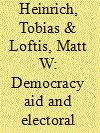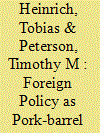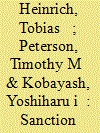|
|
|
Sort Order |
|
|
|
Items / Page
|
|
|
|
|
|
|
| Srl | Item |
| 1 |
ID:
163440


|
|
|
|
|
| Summary/Abstract |
Although foreign policies often fail to successfully promote democracy, over a decade of empirical research indicates that foreign aid specifically for democracy promotion is remarkably successful at improving the survival and institutional strength of fragile democracies. However, these measures cannot tell us how well democracy aid supports the central promise of democracy: accountable government. Since institutions can be subverted in various ways that undermine accountability, it is vital to know whether democracy aid supports accountability to assess its overall success. We provide evidence for this by analyzing incumbent turnover in elections, following poor economic performance—the economic vote—as a measure of voting to achieve performance accountability. In our analysis of over 1,100 elections in 114 developing countries between 1975 and 2010, we find distinct evidence that increasing receipt of democracy aid is associated with more economic voting. Results are robust to numerous alternative empirical specifications.
|
|
|
|
|
|
|
|
|
|
|
|
|
|
|
|
| 2 |
ID:
154847


|
|
|
|
|
| Summary/Abstract |
This article studies whether the pursuit of counterterrorism militarizes foreign aid flows. It focuses on the case of US foreign aid to sub-Saharan African states, which recently have experienced an increase in the presence of al-Qaeda or its affiliate terrorist organizations. This article argues that as terrorist groups carry out attacks inside a state’s territory, aid towards that state will serve such counterterrorism goals. For one, the state’s executive branch will receive increased military aid to immediately fight al-Qaeda or affiliates. For the other, the United States also steps up aid for civil society and development, which could over time undermine al-Qaeda’s mobilization and recruitment efforts. In an empirical analysis that covers 46 African states from 1996 to 2011, our results largely corroborate the hypothesized patterns for attacks that occur on a country territory and in the neighborhood. We note, though, that the overall composition of aid shifts relative to the military when there are direct attacks, something that does not occur when attacks happen in the neighborhood only. Our article concludes that concerns about militarization of aid are warranted, but that actual manifestations are nuanced.
|
|
|
|
|
|
|
|
|
|
|
|
|
|
|
|
| 3 |
ID:
173137


|
|
|
|
|
| Summary/Abstract |
Foreign policy often creates geographically concentrated domestic benefits. A prominent example is the tying of development aid to purchases from the donor country. This feature of aid highlights the utility in examining foreign policy as an instance of pork-barrel politics. Considering tied aid in terms of legislators’ incentives to provide constituent benefits, we argue that people will support an increase in foreign aid spending more when it would promote local economic activity, while opposing aid cuts more when reduced local economic output would result. Crucially, we also expect that people will support their state’s US senator more when informed that the senator attempted to secure (or retain) locally beneficial funds. We find support for our expectations in a novel survey experiment of US citizens. Our results suggest that legislators’ electoral incentives, and consequential local spending, can help explain the adoption of foreign policies despite national-level public disapproval.
|
|
|
|
|
|
|
|
|
|
|
|
|
|
|
|
| 4 |
ID:
153916


|
|
|
|
|
| Summary/Abstract |
Recent research disputes the conventional wisdom that “sanctions do not work.” It demonstrates that states may impose sanctions for purposes beyond seeking an immediate change in the behavior of targeted regimes. For example, democratic leaders often impose sanctions to satisfy their own domestic constituencies. However, we know little about how the consequences of sanctions shape whether or not citizens favor them. Building on insights from prior studies on the use and consequences of sanctions, we develop theoretical expectations regarding the aspects of sanctions that citizens might favor or disfavor. We use these to design and conduct a survey experiment to explore degrees of support for proposed sanctions. We find that on average, citizens support proposed sanctions that they expect will have a long-run impact on the behavior of the targeted state.
|
|
|
|
|
|
|
|
|
|
|
|
|
|
|
|
| 5 |
ID:
158696


|
|
|
|
|
| Summary/Abstract |
How do the human rights practices abroad affect decisions about the allocation of foreign aid? This article provides a new approach to this long-standing question. We bring donor government, donor citizens, and recipients’ attributes together in a single analytical framework. We argue that donor citizens are more self-serving than previously assumed; they do not wholeheartedly support their government punishing human rights abusers when those states provide important policy benefits. When donor governments believe that their citizens will hold them accountable for their policy choices, they make foreign aid decisions that mirror citizens’ self-serving policy preferences. Thus, they avoid punishing repressive regimes that are the sources of valuable benefits. Our experimental and observational results provide support for our claims. Overall, our findings suggest that aid donors selectively punish human rights violators with aid cuts, but their variegated treatment of human rights violators largely stems from the self-serving policy preferences of their voters.
|
|
|
|
|
|
|
|
|
|
|
|
|
|
|
|
|
|
|
|
|